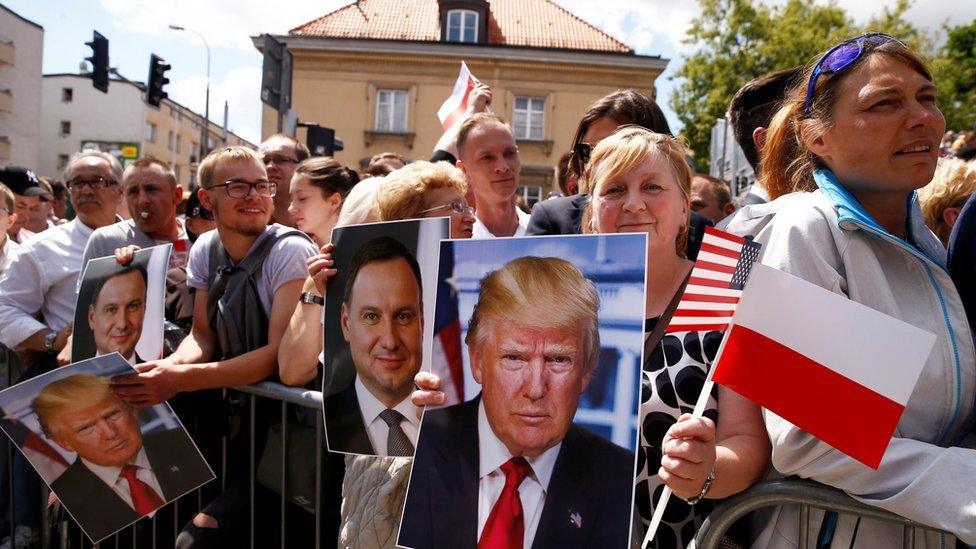Is Moscow falling out of love with Trump?
- Published
Once popular in Russia, opinion of Donald Trump has soured since he came into office
US President Donald Trump's widely anticipated first face-to-face meeting with Russian leader Vladimir Putin has come, but some in Moscow have been left disillusioned over the prospect of a sweetening of ties between Russia and the US, as the BBC's Steve Rosenberg reports.
In a Moscow art gallery, a pianist is performing America the Beautiful.
The scene is surreal. Above me hangs a sculpture of enormous outstretched arms. To my right is what appears to be a tree of twisted arms and legs for branches. A humongous hand is growing out of the wall.
Amongst these curious limbs stands a brand new statue, just unveiled. It depicts a handshake between the former US President Ronald Reagan and his Soviet counterpart Mikhail Gorbachev.
Back in the 1980s, Mr Reagan and Mr Gorbachev overcame mutual suspicion to end the Cold War: an example which the organisers here hope Donald Trump and Vladimir Putin will follow as they hold their first face-to-face meeting.
"It's our message to them, that 'Guys, we are now reaching a very dangerous line. Very dangerous,'" explains Edward Lozansky, president of the American University in Moscow. "It's not even a red line. It's a double or triple red line. 'So you'd better do something.'"
Those "red lines" run through Syria, Ukraine and the Korean peninsula; through America, too, where Russia stands accused of interfering in last year's US presidential election to the benefit of Mr Trump.
"Of course, Putin is in a much better position," Edward Lozansky believes. "He formulates Russian foreign policy and the country backs him, giving him a free hand. Trump is much weaker. Every time he says he wants to improve relations with Russia, he's accused of being a Russian stooge or Kremlin surrogate."
Change of tune
Last month, the Russian government paper Rossiyskaya Gazeta concluded that "it's impossible to expect anything" from a Putin-Trump meeting, since "…the US administration has its hands and legs tied".
This week the business daily Vedomosti suggested that "experts consider it an achievement the talks are happening at all".
The anchor of Russian state TV's flagship News of the Week show, Dmitry Kiselev, said the most Russia could hope for from the bilateral meeting is that Putin and Trump "get to know each other and agree to meet again".
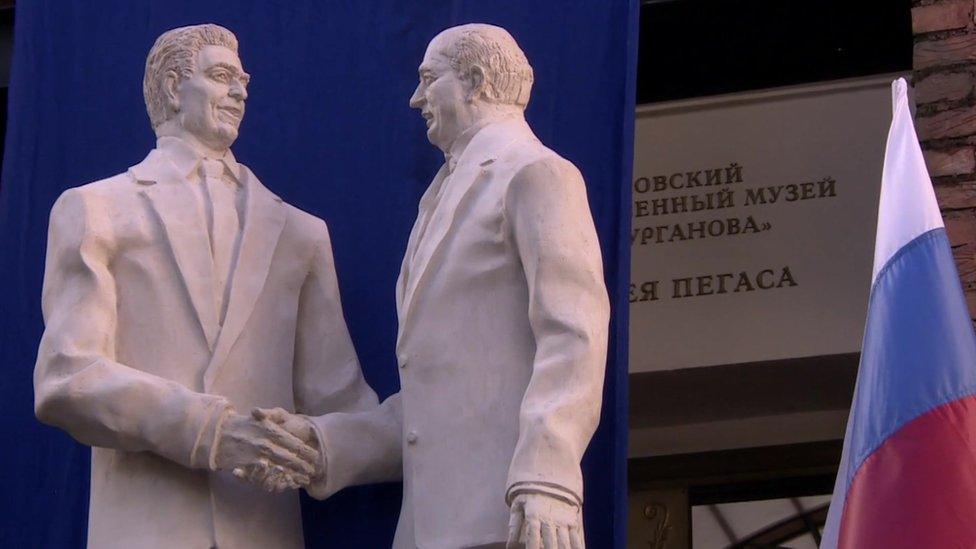
Will the era of past leaders Ronald Reagan and Mikhail Gorbachev (portrayed in this statue in Moscow) be repeated by Mr Putin and Mr Trump?
The tone of the pro-Kremlin media has changed. A few months ago, Russian TV was showering America's president with compliments. Kiselev called him a "real man". More recently, though, the presenter described Mr Trump as "more dangerous" than Kim Jong-un of North Korea.
Following Mr Trump's election victory, Russia was seized with Trumpomania: his portrait slapped on everything from golden iPhones to boxes of sugar cubes.
But US-Russian relations haven't grown sweeter. And that has left some Russians feeling very sour.
Kicked out by the Cossacks
In a park in St Petersburg I meet a group of musical Cossacks. Dressed in full military uniforms, they sing a Cossack prayer, beseeching the Lord to bless the people and provide them with food, truth and freedom.
Watching with me is local Cossack chief Andrey Polyakov. I first met Andrey last November. His community had been so excited by the prospect of a pro-Russia US president, it had made Mr Trump an honorary Cossack.
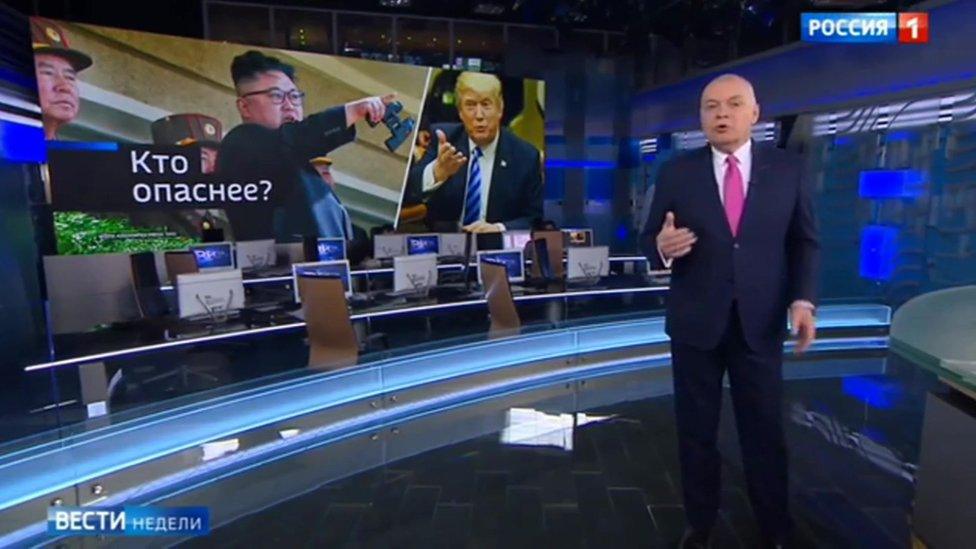
Russian spin doctor Dmitry Kiselev recently compared Donald Trump to Kim Jong-un
Eight months on, Andrey's group has grown so disillusioned with its American 'colleague' that it has expelled Mr Trump from its ranks.
"The US president has broken his promises. And a man must keep his word," Andrey tells me. "He said relations with Russia would improve, that he would reduce funding for Nato and that he would focus on domestic affairs. Instead, the US continues its aggressive foreign policy, for example in the Middle East."
Of course, being kicked out of the Cossacks is the least of Mr Trump's problems. Of greater concern will be the numerous investigations back home into Russia's alleged links to the Trump team.
Like minds?
Whether it's replacing healthcare or building a wall on the Mexican border, from his Muslim travel ban to improving relations with Russia, Mr Trump is finding that election promises are easy to make, but difficult to keep. For all his pre-election talk of getting along with Moscow, the US President will struggle to strike a grand bargain with President Putin.
And yet in terms of character, the two leaders have much in common and could well develop a personal rapport. They share a suspicion of the mainstream Western media and of liberal society, while both seem to eschew political correctness.
Is that enough to forge a US-Russian partnership?
Back at the art gallery, I meet someone who has experience in bringing east and west closer together.
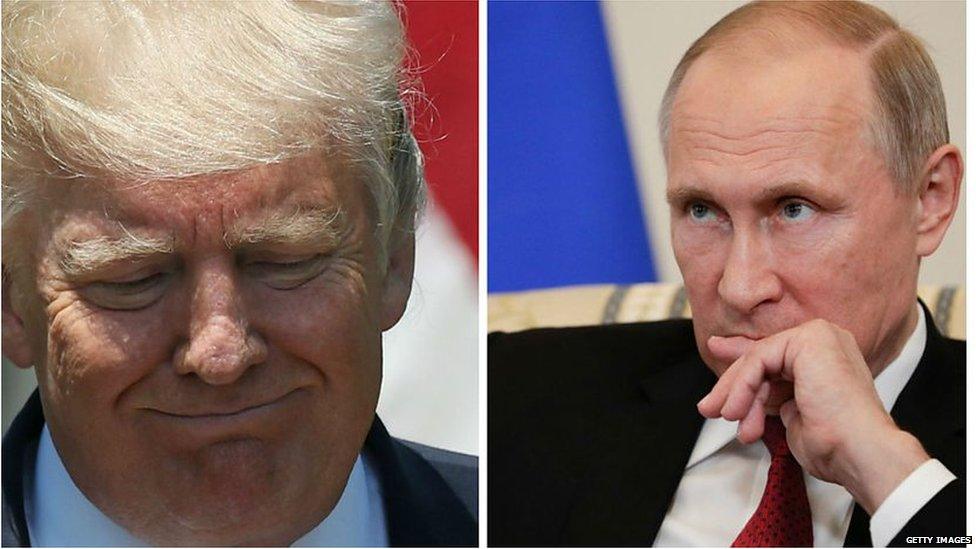
The two leaders see eye-to-eye on many issues
Suzanne Massie is an American writer who fell in love with the Russian people and Russian culture. As an adviser to Ronald Reagan, she was instrumental in changing his perception of the USSR as an evil empire. She would coach him before his meetings with Mr Gorbachev.
Could Mr Trump be a new Reagan?
"Reagan wanted to learn," Suzanne Massie tells me. "He was a deeply religious man with a very great moral compass."
"And Donald Trump?" I ask.
"Trump ought to curb his instant reactions. He's a man who doesn't have experience with all of this. I hope he can listen carefully to the Russian president and think of the good of, not only our people in the United States, but also the Russian people."
- Published6 July 2017
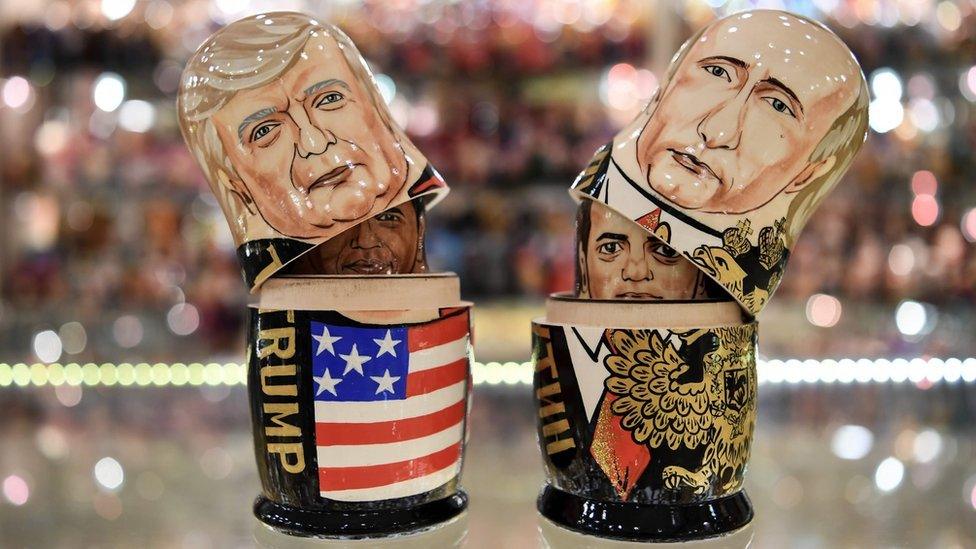
- Published6 July 2017

- Published6 July 2017
